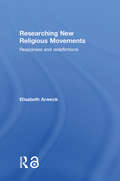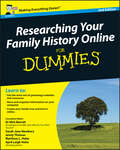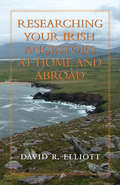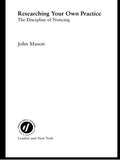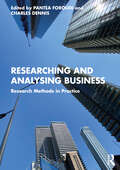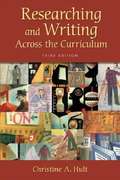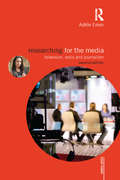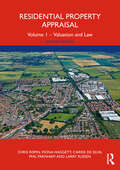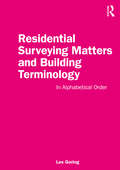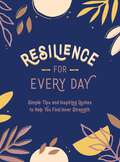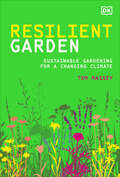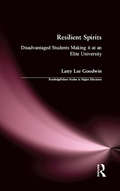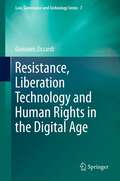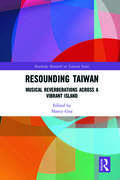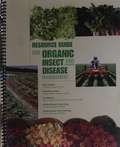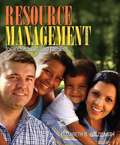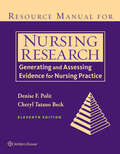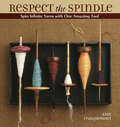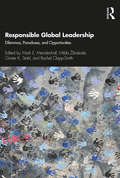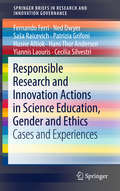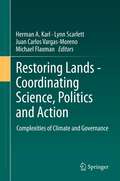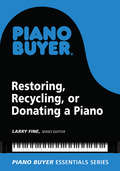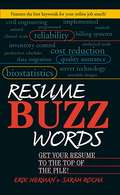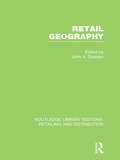- Table View
- List View
Researching New Religious Movements: Responses and Redefinitions
by Elisabeth ArweckNew religious movements such as the Moonies, Jehovah's Witnesses and Hare Krishnas are now well established in mainstream cultural consciousness. But responses to these 'cult' groups still tend to be overwhelmingly negative, characterized by the furious reactions that they evoke from majority interests. Modern societies need to learn how best to respond to such movements, and how to interpret their benefits and dangers.Researching New Religious Movements provides a cutting-edge analysis of the controversy around new religions in America and Europe today. Drawing on original fieldwork, it explores the battles between the recruiting factions of groups like the Moonies, and the anti-cult movements and Church societies that have mobilized to oppose these. It considers academic and media interventions on both sides, placing special emphasis on the problems of objectivity inherent in the language of 'sects', 'abduction' and 'brainwashing'. Ideal for students, researchers and professionals, this provocative and much-needed book takes the debate over new religious movements to a newly sophisticated level.
Researching Your Family History Online For Dummies
by Matthew L. Helm April Leigh Helm Sarah Newbery Jenny Thomas Nick BarrattNavigate your way through your family's past. Interested in family history? Keen to discover who your ancestors really were? Want to find out more from the comfort of your own home? If so, this book is for you. Walking you through the process of researching, organising and presenting your family tree online, this expert guide makes it simple. So what are you waiting for? Get plugged in and start tracking down your ancestors today!Lay the groundwork - take the first steps on your genealogical journey and start searching for evidence. Find out about your ancestors - discover who your predecessors were and where they came from. Get to grips with research tools - find the best online and offline archives and dig deeper into your family's past. Present your results effectively - compile your findings into a family tree and create a place to host your material online. Open the book and find:What clues you can get from photos, letters, diaries and your relatives. The best genealogy websites in the UK and around the worldHow to get the most out of archives and documents. Techniques for creating family history charts on your computerThe advantages of coordinating your hunt with other researchers. Ways to share research online. Tips and tricks for building a family history web page. Learn to: Get the most out of genealogy websites and resources. Store and organise information on your computer. Create your family tree and host it online.
Researching Your Irish Ancestors at Home and Abroad
by David R. ElliottA one-stop guide for people seeking information about their ancestors in Ireland. This book will help all those, no matter where they live, who are searching for ancestors in Ireland. David R. Elliott has taken eight research trips to Ireland on behalf of his clients and has worked in most archival repositories in the Republic of Ireland and Northern Ireland. Dr. Elliott gives clues to finding your ancestral county, then the parish and townland within the county. He explains how Irish archival centres work and describes how you can flesh out your ancestors lives and what you might find in cemeteries.An experienced genealogist and seasoned traveller, Dr. Elliott gives practical advice on preparing for your trip with tips on travel, driving, accommodation, and meals. Ireland’s unique history is outlined, as well as the impact that religion and politics have had on genealogical research. An annotated bibliography and a review of important websites round out this illustrated guide.
Researching Your Own Practice: The Discipline of Noticing
by John MasonCentral to caring professions such as teaching is the need to notice and be sensitive to the experiences of pupils and teachers. Starting from this position, Researching Your Own Practice demonstrates that in order to develop your professional practice you must first develop your own sensitivities and awareness. One must be attuned to fresh possibilities when they are needed and be alert to such a need through awareness of what is happening at any given time.By giving a full explanation of this theory and a guide to its implementation, this book provides a practical approach to becoming more methodical and systematic in professional development. It also gives the reader a basis for turning professional development into practitioner research, as well as giving advice on how noticing can be used to improve any research, or be used as a research paradigm in its own right.The discipline of noticing is a groundbreaking approach to professional development and research, based upon noticing a possibility for the future, noticing a possibility in the present moment and reflecting back on what has been noticed before in order to prepare for the future. John Mason, one of the discipline's most authoritative exponents, provides us here with a clear, persuasive and practical guide to its understanding and implementation.
Researching and Analysing Business: Research Methods in Practice
by Charles Dennis Pantea ForoudiResearching and Analysing Business: Research Methods in Practice provides an accessible and practical guide to various data collection and data analysis techniques within management, from both quantitative and qualitative perspectives. This key resource functions as a comprehensive reference tool – covering a broad variety of methodologies – examining both the theory behind them and their application in practice. These include systematic literature review through bibliometric and meta-analysis, secondary vs primary sources, qualitative research vs quantitative research, combining qualitative and quantitative methods, qualitative and quantitative research method approaches, fsQCA, data mining, and sentiment analysis. Chapters are rich in examples, data sets, practical exercises, easy-to-follow slides, and a glossary, which help readers to understand and apply research approaches as well as to assess the strengths and weaknesses of each method. Unique in its practical approach and with insights from active researchers, this book is required and recommended reading for advanced undergraduate and postgraduate students studying research methods as a core module within business and management courses. It is also a useful tool for PhD students and academics within the discipline. Online support materials include PowerPoint slides.
Researching and Writing Across the Curriculum (Third Edition)
by Christine A. HultThis thorough and engaging guide to research in the humanities, sciences, social sciences, and business teaches students to explore the entire research process, including intellectual inquiry and critical thinking. Researching and Writing Across the Curriculum provides discipline-specific guidance and sample papers that reflect differences in discourse and presentation in each discipline. The text also covers research methods and resources as they apply to all disciplines, with a comprehensive list of library resources and an introduction to the latest electronic and online resources. With thorough and up-to-date material on the impact of computers in research, and exercises that develop the skills of summarizing, synthesizing, and critiquing source materials, the text provides a complete guide that will aid students in all their college courses and beyond.
Researching for the Media: Television, Radio and Journalism (Media Skills)
by Adele EmmResearching for the Media: Television, Radio and Journalism is an essential guide to researching for the media industry. It explains the role of the researcher and journalist within radio, television and journalism exploring key areas of what to expect in the job. Researching for the Media: Television, Radio and Journalism offers advice and instruction on practical, ethical and legal issues which affect anyone working in these industries. Beginning with suggestions on how to think up ideas and how to devise treatments, through to general research methods and techniques and guidance on working on location at home and abroad, it uses real examples of good and bad practice from the industry. Written by an experienced researcher, writer and producer, Researching for the Media includes: Tips on finding contributors from contestants, experts and specialists through to audiences and celebrities How to find photographs, picture and film clips and the ethical and legal issues involved Advice on finding and using music and copyright issues How the media uses the internet and social media such as Twitter, Facebook, Instagram A discussion of risk assessment, codes of conduct, ethical behaviour and legal and safety issues A glossary of media terms, further reading and a list of helpful websites. Discover more at www.adeleemm.com
Residential Property Appraisal: Volume 1 - Valuation and Law
by Phil Parnham Chris Rispin Carrie de Silva Fiona Haggett Larry RussenResidential Property Appraisal, Volumes 1 and 2 are essential handbooks not only for students studying surveying but also for surveyors and others involved in the appraisal of residential property. Volume 1 has been updated and covers the valuation process as it relates to residential properties, particularly when valuation is undertaken for secured lending purposes. It addresses the basic skills required, the risks posed in a valuation, the key drivers of value, emerging issues that impact valuation and the key legal and RICS Regulatory considerations that a valuer needs to understand. Volume 2 of the book goes on to address the inspection and survey of residential properties, covering new technology, modern methods of construction, problem plants and pests, damp in new builds, and modern building services. New challenges for the surveyor to consider include the health and well-being of building occupants, the Party Wall etc. Act 1996 and schedules of condition, energy and building performance, and owner-occupied and tenanted properties. An essential book for students studying to enter the residential survey and valuation profession and for existing practitioners who wish to improve their knowledge of industry practices.
Residential Surveying Matters and Building Terminology: In Alphabetical Order
by Les GoringThis is an ideal reference book for students (undergraduates and postgraduates) studying Building Surveying, Quantity Surveying, or Architecture, etc. It should also be of use to the Construction-related legal profession, Property Managers and Letting Agents. Builders (and homeowners, interested in identifying faults in their property), should also benefit from this book. Residential Surveying Matters and Building Terminology covers a wide range of new and old building terms, techniques, technologies and materials, but much more extensively than the average dictionary. The alphabetical format makes it easy to check up on terms and subject-areas quickly – and the detailed coverage (including helpful drawings by the author) provides clear guidance to the reader. This book covers a multitude of subject-areas, including condensation problems, cellar rot, wet rot and dry rot, thermal cracks, settlement cracks, metal wall-tie corrosion-and-expansion cracks, subsidence cracks, roof-spread recognition, bulging- and/or leaning-walls, etc. Further subject areas include inspecting and analysing residential building-structures, both internally and externally; appraising underground drainage systems; and personal commentary on survey report writing.
Resilience for Every Day: Simple Tips and Inspiring Quotes to Help You Find Inner Strength
by Summersdale PublishersLife isn’t always a stroll in the sunshine, but there are ways of weathering the storms. This pocket-sized book of heartening quotations and simple but effective tips will help you summon your inner reserves and bounce back from adversity stronger than ever.
Resilience for Every Day: Simple Tips and Inspiring Quotes to Help You Find Inner Strength
by Summersdale PublishersLife isn’t always a stroll in the sunshine, but there are ways of weathering the storms. This pocket-sized book of heartening quotations and simple but effective tips will help you summon your inner reserves and bounce back from adversity stronger than ever.
Resilient Garden: Sustainable Gardening for a Changing Climate
by Tom MasseyCreate a beautiful, climate-resilient, sustainable garden that will take your outdoor space into the future.As we live with an increasingly changing climate, summer droughts, winter waterlogging, high winds, erratic frosts, and frequent pests are challenges that many gardeners may face in different regions around the world. This cutting-edge book-grounded in the latest RHS research-shows you how to work with the environment and adapt your outdoor space to give it exactly what it needs to flourish ... and to give wildlife a helping hand, too.Discover how a hedge can reduce noise and trap pollution, how a patio affects waterlogging, how to create a vertical green wall of homegrown vegetables, how to harvest your rainwater, and much more.Award-winning garden designer Tom Massey shares essential tips on how to analyze your backyard, looking at everything from soil type to sun exposure, before recommending practical projects and plant choices that will be perfect for your plot. Together we can garden more sustainably; mitigate extreme weather conditions; and ensure our outdoor spaces remain resilient, beautiful, inspiring places to enjoy for years to come.
Resilient Spirits: Disadvantaged Students Making it at an Elite University (RoutledgeFalmer Studies in Higher Education)
by Latty Lee GoodwinThis study explores the identity construction of socioeconomically and educationally disadvantaged students who enter an elite university. This critical ethnography gathered qualitative data about the twenty-three participants through non-participant observation, in-depth interviews, and focus groups. Faculty, staff, and administrators were also interviewed.
Resistance, Liberation Technology and Human Rights in the Digital Age
by Giovanni ZiccardiThis book explains strategies, techniques, legal issues and the relationships between digital resistance activities, information warfare actions, liberation technology and human rights. It studies the concept of authority in the digital era and focuses in particular on the actions of so-called digital dissidents. Moving from the difference between hacking and computer crimes, the book explains concepts of hacktivism, the information war between states, a new form of politics (such as open data movements, radical transparency, crowd sourcing and "Twitter Revolutions"), and the hacking of political systems and of state technologies. The book focuses on the protection of human rights in countries with oppressive regimes.
Resounding Taiwan: Musical Reverberations Across a Vibrant Island (Routledge Research on Taiwan Series)
by Nancy GuyThis book vibrantly demonstrates how the study of music allows for identification and interpretation of the forces that form Taiwanese society, from politics and policy to reactions to and assertions of such policies. Contributors to this edited volume explore how music shapes life — and life shapes music — in Taiwan, focusing on subjects ranging from musical life under Japanese colonial rule (1895–1945) through to the contemporary creations of Indigenous musicians, popular music performance and production, Christian religious music, traditional ritual music and theatre, conceptions about sound and noise, and garbage truck music's role in reducing household waste. The volume’s twelve chapters present diverse approaches to their sounding subjects, some deeply rooted in the methods and concerns explored by Taiwan's first generation of ethnomusicologists. Others employ current social theories. Presenting a window into the cultural lives of the residents of this multicultural, politically contested island, Resounding Taiwan will appeal to students and scholars of musicology and ethnomusicology, anthropology and Asian studies more widely.
Resource Guide for Organic Insect and Disease Management
by Brian Caldwell Emily Brown Rosen Eric Sideman Anthony M. Shelton Christine D. SmartThis guide was developed to provide a useful and scientifically accurate reference for organic farmers and agricultural professionals searching for information on best practices, available materials and perhaps most importantly, the efficacy of materials that are permitted for use in organic systems. The Guide is divided into three sections. The first section provides cultural information and management practices for a number of important vegetable crop groups. The second section is a set of generic fact sheets about specific materials that can be used in organic systems. The last section contains appendices with useful information about additional practices such as plant resistance, trap cropping, habitats for beneficial insects, the concepts of induced or systemic acquired resistance, materials exempt from pesticide regulation, and additional resources.
Resource Management For Individuals And Families (Fifth Edition)
by Elizabeth B. GoldsmithResource Management for Individuals and Families contains 14 well-organized chapters divided into four parts to introduce students to the best of management thinking and practice. The fifth edition offers a new, interactive approach to teaching resource management through special features that are specifically designed to reflect the themes of choice and decision making, supporting students' interest and learning. To engage the reader, many chapters begin with a case or story from the news about families. This edition continues to pay close attention to meeting the standards and criteria for the Certified Family Life Educator (CFLE) designation of the National Council on Family Relations (NCFR).
Resource Manual for Nursing Research: Generating and Assessing Evidence for Nursing Practice
by Roy K. AaronComplete with full research reports, critiques, and the innovative online Toolkit, this knowledge-building companion to Nursing Research: Generating and Assessing Evidence for Nursing Practice reinforces the acquisition of basic research skills and enhances students’ ability to confidently conduct, appraise, and critique research studies. Learning exercises emphasize careful reading and critical appraisal; robust appendices deliver fast access to a wide range of nursing research reports; and the timesaving online Toolkit provides best-practice research resources that can be easily adapted to meet individual needs. Crossword Puzzles provide an entertaining and challenging review of key terms and concepts. Study Questions encourage critical thinking and reinforce the most relevant content from each textbook chapter. Application Exercises hone students’ ability to read, comprehend and critique nursing studies most effectively. Full research reports in the robust appendices cover a wide range of endeavors. TheToolkit delivers fast online access to dozens of timesaving, adaptable resources that can be downloaded and customized to meet your specific needs.
Respect the Spindle: Spin Infinite Yarns with One Amazing Tool
by Abby FranquemontEnjoying a resurgence in popularity thanks to the current trend of DIY crafts, the hand spindle remains one of the most productive, versatile, and convenient tools for creating stunning fiber arts from home, as this beautifully illustrated guide from a veteran spinner and spindle aficionado demonstrates. With step-by-step instructions, this essential manual details the basic steps of spinning and then advances to the more complicated spinning wheel, showing how to use the spindle to make specific types of yarn, explaining traditional spindle spinning techniques, and detailing five simple projects designed to instill confidence in creating a variety of yarns with this simple tool. Combining fascinating historical narratives, traditions, and cultures from around the globe with vivid photography, this all-encompassing tour of the spindle also boasts easy-to-follow, contemporary techniques and styles that affirm the tool's enduring legacy.
Responsible Global Leadership: Dilemmas, Paradoxes, and Opportunities
by Günter K. Stahl Mark E. Mendenhall Milda Zilinskait 279 Rachel Clapp-SmithThe need to ensure principle-driven, legally sound, and ethically acceptable behavior in the global context is not an easy task for leaders. They face the requirement of meeting the needs and expectations of a diverse set of stakeholders. They are increasingly called upon to protect, preserve, and restore the resources of the environment. They are expected to improve human well-being and social equity and recognize and effectively address economic and social issues concerning equality, social justice, and human rights protection. How should leaders in global organizations go about meeting the multiple demands of a complex global stakeholder environment? This book explores the dilemmas, paradoxes, and opportunities that leaders in global organizations of all types confront daily and addresses how managers can and should think about and approach these complex issues in responsible and productive ways. This book will be of interest to students and scholars across business, management and the social sciences more broadly.
Responsible Research and Innovation Actions in Science Education, Gender and Ethics: Cases and Experiences (SpringerBriefs in Research and Innovation Governance)
by Hans Thor Andersen Fernando Ferri Ned Dwyer Saša Raicevich Patrizia Grifoni Husne Altiok Yiannis Laouris Cecilia SilvestriThis book gathers case studies presented at the International Conference on Responsible Research and Innovation in Science, Innovation and Society (RRI-SIS2017). It highlights European initiatives and projects in various domains and contexts, each of which explores how to create guidelines and good practices for Responsible Research and Innovation and how to promote them among citizens, industry stakeholders, policy and decision makers, research funders and educational institutions to foster their adoption as a potential benchmark in establishing RRI processes. Further, the book discusses gender and ethical issues, which are highly relevant for RRI initiatives in connection with representativeness, risks and in some cases, minority rights.
Restoring Lands - Coordinating Science, Politics and Action
by Herman Karl Juan Carlos Vargas-Moreno Lynn Scarlett Michael FlaxmanEnvironmental issues, vast and varied in their details, unfold at the confluence of people and place. They present complexities in their biophysical details, their scope and scale, and the dynamic character of human action and natural systems. Addressing environmental issues often invokes tensions among battling interests and competing priorities. Air and water pollution, the effects of climate change, ecosystem transformations--these and other environmental issues involve scientific, social, economic, and institutional challenges. This book analyzes why tackling many of these problems is so difficult and why sustainability involves more than adoption of greener, cleaner technologies. Sustainability, as discussed in this book, involves knowledge flows and collaborative decision processes that integrate scientific and technological methods and tools, political and governance structures and regimes, and social and community values. The authors synthesize a holistic and adaptive approach to rethinking the framework for restoring healthy ecosystems that are the foundation for thriving communities and dynamic economies. This approach is that of collective action. Through their research and practical experiences, the authors have learned that much wisdom resides among diverse people in diverse communities. New collaborative decision-making institutions must reflect that diversity and tap into its wisdom while also strengthening linkages among scientists and decision makers. From the pre-publication reviews: "Finally, we have a book that explains how science is irrelevant without people. It's people who decide when and how to use science, not scientists. This book gives us a roadmap for how to really solve complex problems. It involves hard work, and creating new relationships between scientists and the public that don't typically exist in our society." -John M. Hagan, Ph.D. President, Manomet Center for Conservation Sciences
Restoring, Recycling, or Donating a Piano
by Larry FineThe Piano Buyer Essentials SeriesThe Piano Buyer Essentials Series brings together in one place the very best and most important articles from our 30 years of publishing on the subject of buying and owning a piano. Each e-book is a compilation of articles from current and past issues of Acoustic & Digital Piano Buyer, a semiannual consumer publication devoted to the purchase of new, used, and restored acoustic pianos and digital pianos. The e-books may also contain excerpts from The Piano Book, by Larry Fine, and from pieces published only on PianoBuyer.com. For reader convenience, articles and excerpts have been grouped by subject. However, because some pieces apply to more than one subject, there is some duplication of articles among the e-books in the series.
Resume Buzz Words: Get Your Resume to the Top of the Pile!
by Erik Herman Sarah RochaIn today’s ultracompetitive job market, your resume needs the right edge to stand out among a sea of applicants. Using powerful words when crafting your resume can mean the difference between getting the interview and getting left out. Resume Buzz Words offers hundreds of words and phrases that help you rise above the pack and land the hottest jobs. This compact volume offers you: -Buzz words in every career category-from Education and Computers to Real Estate and Retail -600 powerful action verbs that will get your resume to the top of the pile -500 positive adverbs to get you noticed -Dozens of attention-grabbing examples to use in resumes and interviews Meticulously researched to help you find just the right words, this handy book has the power to make you create the buzz!
Retail Geography (Routledge Library Editions: Retailing and Distribution)
by John A. DawsonStudies of the organisation and location of retailing activity have played a central role in the emergence of urban geography as a major area of academic study. Moreover, retailing is increasingly the focus of interdisciplinary research, with economists, sociologists, psychologists and marketing specialists all contributing. This book surveys and sets in context the wide range of research work that has recently been done on retailing. It concentrates on western industrial societies, particularly Britain and the USA, and considers empirical research, theory and theoretical applications. Topics covered include location analysis which is a traditional area of academic interest; consumer behaviour, which is of particular interest to psychologists, and retail organisation and government involvement, which will interest all those concerned, especially those actually involved in retail planning and management. This comprehensive book is the first substantial review of research in retail geography and suggests many future lines of research within the field. Originally published 1980.
